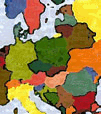No one goes to academic conferences merely to hear the papers being presented, no matter how excellent they might be. Rather, conferences offer a far wider range of opportunities to those who attend, not least the chance to meet and talk (and eat and drink) with fellow academics from other countries.
The recent conference on the Social History of Central European Politics, 1945-1953, at the University of Swansea was no exception to this rule. Indeed, one of the stated objectives of the conference was "to provide a forum for British and Central European scholars to discuss the implications of their research," and to allow them to "benefit from a comparative insight into the work of others."
With participants from a variety of British universities and from other institutions in Germany, Austria, the Czech Republic, Hungary and North America, there was plenty of scope at the conference to carry this objective.
The usefulness of this approach was clearly highlighted when I accompanied an assorted group of Central European and British academics for a curry on the last night of the proceedings. For some it was their first visit to such an establishment. Nothing quite like trying to explain the vagaries of Indian cuisine to those who have never been exposed to it before, a quintessentially British experience.
Quite by accident, we happened to dine there the day before the British Foreign Secretary's remarks on England's chicken tikka masala culture. More to the point, few could have imagined, even fifteen years ago, that such a dining experience, in such company, would have been possible. Anymore than they could have imagined that, after such a long history of English colonialism, Wales would now be on the road to limited self-rule. If a meal could be a symbolic representation of the "New Europe" that we all currently inhabit, then this was surely it.
Had the provision of a "forum" been its only purpose, the conference would have been interesting enough, but it was not. The organisers, Jill Lewis and Gareth Pritchard, also designed it to investigate the still elusive nexus between society and high politics in Central Europe free "of the distortions caused by the political imperatives of the Cold War."
A powerful influence
Even though eleven years have elapsed since the end of that international dynamic, the intellectual constraints and stereotypes it fostered continue to exert a powerful influence on East European studies in particular, and Western perspectives in general. Trying to achieve a coherent understanding of the historical realities of Communist Eastern Europe, free of well-worn Cold War prejudices, is no simple undertaking.
On this point, the papers presented, and the conference as whole, made significant strides in the right direction. The presentations themselves were divided into various thematic sections: Nationalism and Minorities, Veterans, Youth, Women, Artists and Workers. And, although papers on the former German Democratic Republic (GDR) predominated, as one would expect from a conference organised in conjunction with the German History Society, presentations were also made dealing with issues in Austria, Czechoslovakia and Hungary.
The comparative aspects of these papers were particularly illuminating. What emerged, especially in the papers on Youth and Women, were the genuine similarities between East and West during this period, rather than the usually held assumptions of the differences betwixt the two halves of the same continent. They were not the same, but, perhaps we are now beginning to realise that "we" in the West, had, and still have, much more in common with "them" in the East than we usually like to think.
The deep ideological divides that characterised the Cold War have left lasting scars on the intellectual landscape of Europe. In particular, they still hinder the historian's ability to peer, clear eyed, back at those crucial years after the end of the Second World War, when Allies became enemies.
There is still a long way to go before a genuinely holistic—post-Cold War—history of the social influences on high politics emerges, but, on the evidence of conferences such as this one, contemporary Europe is well on the way to making such objectives a reality.
Martin D Brown, 7 May 2001
For further information:
The German History Society page
Moving on:
- Archive of Martin D Brown's articles in CER
- Browse through the CER eBookstore for electronic books
- Buy English-language books on Central Europe through CER
- Return to CER front page




